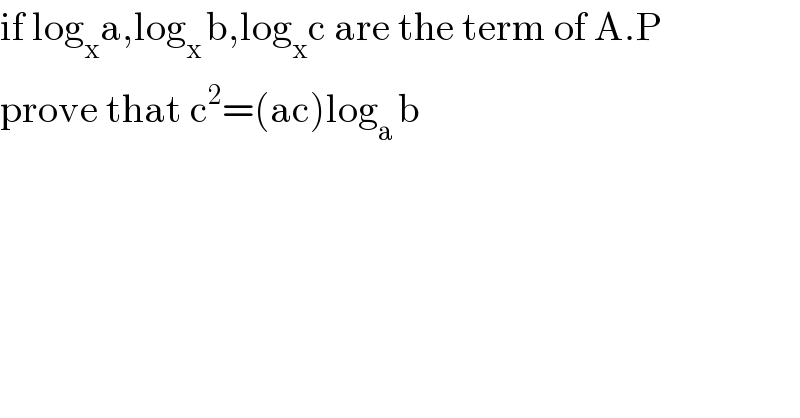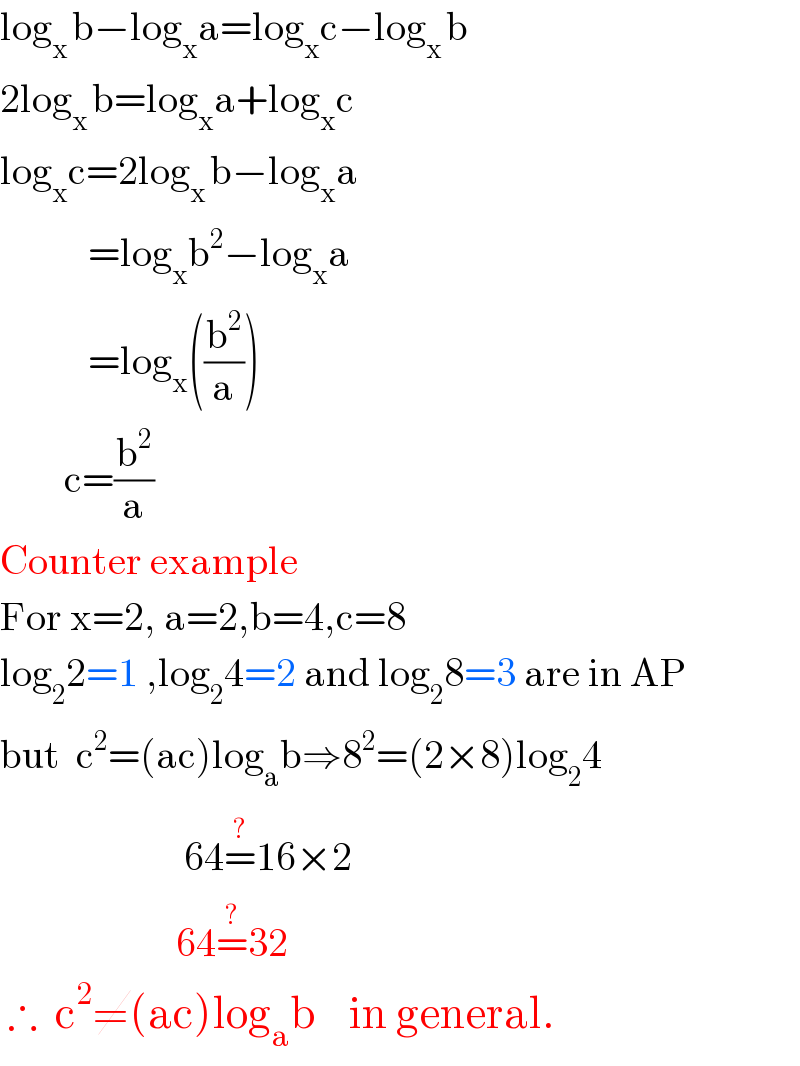
Question Number 8893 by j.masanja06@gmail.com last updated on 04/Nov/16

$$\mathrm{if}\:\mathrm{log}_{\mathrm{x}} \mathrm{a},\mathrm{log}_{\mathrm{x}\:} \mathrm{b},\mathrm{log}_{\mathrm{x}} \mathrm{c}\:\mathrm{are}\:\mathrm{the}\:\mathrm{term}\:\mathrm{of}\:\mathrm{A}.\mathrm{P} \\ $$$$\mathrm{prove}\:\mathrm{that}\:\mathrm{c}^{\mathrm{2}} =\left(\mathrm{ac}\right)\mathrm{log}_{\mathrm{a}\:} \mathrm{b} \\ $$
Commented by j.masanja06@gmail.com last updated on 04/Nov/16

$$\mathrm{i}\:\mathrm{apreciate}\:\mathrm{sir}!\:\mathrm{it}\:\mathrm{righty}\:\mathrm{that}\:\mathrm{c}^{\mathrm{2}} =\left(\mathrm{ab}\right)^{\mathrm{log}_{\mathrm{a}} \mathrm{b}} ! \\ $$
Commented by 123456 last updated on 07/Nov/16

$$\mathrm{log}_{{x}} {b}−\mathrm{log}_{{x}} {a}=\mathrm{log}_{{x}} {c}−\mathrm{log}_{{x}} {b}\left(\boldsymbol{\div}\mathrm{log}_{{x}} {a}\right) \\ $$$$\mathrm{log}_{{a}} {b}−\mathrm{1}=\mathrm{log}_{{a}} {c}−\mathrm{log}_{{a}} {b} \\ $$$$\mathrm{2log}_{{a}} {b}=\mathrm{1}+\mathrm{log}_{{a}} {c} \\ $$
Answered by Rasheed Soomro last updated on 04/Nov/16

$$\mathrm{log}_{\mathrm{x}\:} \mathrm{b}−\mathrm{log}_{\mathrm{x}} \mathrm{a}=\mathrm{log}_{\mathrm{x}} \mathrm{c}−\mathrm{log}_{\mathrm{x}\:} \mathrm{b} \\ $$$$\mathrm{2log}_{\mathrm{x}\:} \mathrm{b}=\mathrm{log}_{\mathrm{x}} \mathrm{a}+\mathrm{log}_{\mathrm{x}} \mathrm{c} \\ $$$$\mathrm{log}_{\mathrm{x}} \mathrm{c}=\mathrm{2log}_{\mathrm{x}\:} \mathrm{b}−\mathrm{log}_{\mathrm{x}} \mathrm{a} \\ $$$$\:\:\:\:\:\:\:\:\:\:\:=\mathrm{log}_{\mathrm{x}} \mathrm{b}^{\mathrm{2}} −\mathrm{log}_{\mathrm{x}} \mathrm{a} \\ $$$$\:\:\:\:\:\:\:\:\:\:\:=\mathrm{log}_{\mathrm{x}} \left(\frac{\mathrm{b}^{\mathrm{2}} }{\mathrm{a}}\right) \\ $$$$\:\:\:\:\:\:\:\:\mathrm{c}=\frac{\mathrm{b}^{\mathrm{2}} }{\mathrm{a}} \\ $$$$\mathrm{Counter}\:\mathrm{example} \\ $$$$\mathrm{For}\:\mathrm{x}=\mathrm{2},\:\mathrm{a}=\mathrm{2},\mathrm{b}=\mathrm{4},\mathrm{c}=\mathrm{8} \\ $$$$\mathrm{log}_{\mathrm{2}} \mathrm{2}=\mathrm{1}\:,\mathrm{log}_{\mathrm{2}} \mathrm{4}=\mathrm{2}\:\mathrm{and}\:\mathrm{log}_{\mathrm{2}} \mathrm{8}=\mathrm{3}\:\mathrm{are}\:\mathrm{in}\:\mathrm{AP} \\ $$$$\mathrm{but}\:\:\mathrm{c}^{\mathrm{2}} =\left(\mathrm{ac}\right)\mathrm{log}_{\mathrm{a}} \mathrm{b}\Rightarrow\mathrm{8}^{\mathrm{2}} =\left(\mathrm{2}×\mathrm{8}\right)\mathrm{log}_{\mathrm{2}} \mathrm{4} \\ $$$$\:\:\:\:\:\:\:\:\:\:\:\:\:\:\:\:\:\:\:\:\:\:\:\mathrm{64}\overset{?} {=}\mathrm{16}×\mathrm{2} \\ $$$$\:\:\:\:\:\:\:\:\:\:\:\:\:\:\:\:\:\:\:\:\:\:\mathrm{64}\overset{?} {=}\mathrm{32} \\ $$$$\:\therefore\:\:\mathrm{c}^{\mathrm{2}} \neq\left(\mathrm{ac}\right)\mathrm{log}_{\mathrm{a}} \mathrm{b}\:\:\:\:\mathrm{in}\:\mathrm{general}.\:\:\:\: \\ $$
Commented by j.masanja06@gmail.com last updated on 04/Nov/16

$$\mathrm{but}\:\mathrm{you}\:\mathrm{didn}'\mathrm{t}\:\mathrm{show}\:\mathrm{that}\:\mathrm{c}^{\mathrm{2}} =\left(\mathrm{ac}\right)\mathrm{log}_{\mathrm{a}} \mathrm{b}! \\ $$
